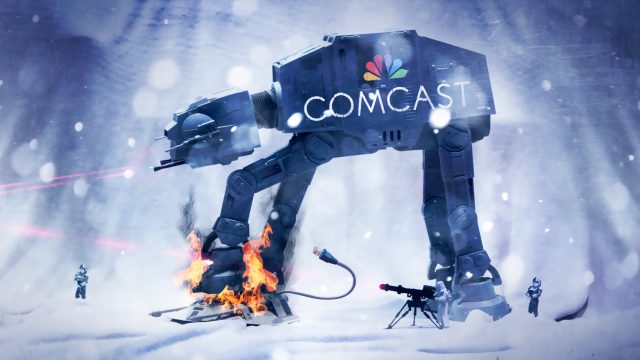
After Comcast terminated its deal to buy Time Warner Cable today, government officials explained why they worked behind the scenes to kill the merger.
Though they never publicly stated their intentions after the deal was dead, both the Department of Justice and the Federal Communications Commission had made it clear to Comcast that they were unlikely to let the merger proceed. They listened to merger opponents who described numerous problems, but one concern stood out above all others: that Comcast, already the biggest cable company in the nation, could use its increased size to stifle the competition that online video streaming services pose to cable TV.
FCC Chairman Tom Wheeler said, "The proposed merger would have posed an unacceptable risk to competition and innovation especially given the growing importance of high-speed broadband to online video and innovative new services." The DOJ said it "informed the companies that it had significant concerns that the merger would make Comcast an unavoidable gatekeeper for Internet-based services that rely on a broadband connection to reach consumers."
Before Comcast gave up, the FCC was reportedly close to referring the merger to an administrative law judge, making approval unlikely. Attorney General Eric Holder authorized the Justice Department to file an antitrust lawsuit challenging the deal, according to The Wall Street Journal.
"Justice Department officials were focused on the fact that a combined Comcast-Time Warner Cable would have about 57 percent of the broadband market," the Journal wrote. "That amount of control over the nation’s Internet pipes would have given the firm the ability to restrain companies such as Netflix Inc., Amazon.com Inc. and Google Inc. that deliver programming over broadband, the department believed. Antitrust officials also believed a bigger Comcast could have made it harder for TV channel owners to offer video programming directly to consumers over the Internet."
Holder called the deal breakup a "victory... for providers of content and streaming services who work to bring innovative products to consumers across America and around the world." Another Justice Department official told the Journal that “If you have close to 60 percent of the high-speed eyeballs, that’s a pretty big gateway."
Comcast is still a huge gateway to consumers, one that streaming providers cannot ignore. Even without Time Warner Cable, Comcast already has a majority of the nation's "broadband" subscribers, counting only those connections of at least 25Mbps downstream and 3Mbps upstream. The FCC changed the definition of broadband earlier this year, essentially cutting DSL off the list of technologies that can be considered advanced telecommunications.
"At this moment, only fiber gives the local cable company a competitive run for its money," Wheeler said last year while describing the lack of competition for high-speed broadband.
In addition to dominating the cable industry, Comcast is now building out a fiber-to-the-home service across much of its national footprint.
There are multiple ways Comcast could make it hard for online services to compete. Comcast has been slow in allowing streaming services that require cable TV subscriptions to work on certain devices that attach to its network.Comcast also controversially demanded payments from Netflix in exchange for giving the company a direct connection to its network. Interconnection payments aren't unusual, and Netflix also paid Time Warner Cable, Verizon, and AT&T. But merger opponents said allowing Comcast to become even larger would give the company more leverage over online streaming services that compete against traditional pay-TV packages.
Many of the concerns raised by merger opponents had to do with Comcast owning programming networks in addition to its broadband and cable TV holdings. As owner of NBCUniversal and various regional sports networks, Comcast collects money from its pay-TV rivals in exchange for providing programming.
But in 2011, the DOJ and FCC allowed Comcast to buy NBCUniversal. Many opponents of the Comcast/TWC merger praised the agencies for taking a different approach this time.
“I’m glad that the Department of Justice and the FCC—the agencies charged with examining this deal—recognized that there was serious cause for concern," Sen. Al Franken (D-Minn.) said. "I also appreciate that it appears that they took into account Comcast's abysmal record of adhering to the conditions of its acquisition of NBCUniversal—one of the chief reasons I believe Comcast could not be trusted with so much power. We need more competition in the cable and broadband markets, not less, and allowing Comcast to buy its biggest competitor would have been a disaster. The deal would have created a colossal company that would have been able to dominate its competition and abuse its subscribers."
"New online video services shouldn’t have to ask Comcast for permission to reach viewers or access content," said John Bergmayer, senior staff attorney at advocacy group Public Knowledge. "Buying Time Warner Cable would have given Comcast unprecedented gatekeeper power—the ability to extract tolls and onerous conditions from Internet services and programmers that need to access Comcast's millions of subscribers. This, in turn, would have raised prices for Internet users and TV viewers nationwide, while reducing their choices. Comcast would have been able to use this strengthened gatekeeper power in conjunction with its other businesses—its TV network, its movie studio, its set-top box platform, and its ventures into online video—to ensure that it remained the dominant video platform of the future, even as technology opens up opportunities for new services."
reader comments
102